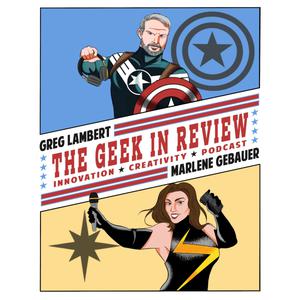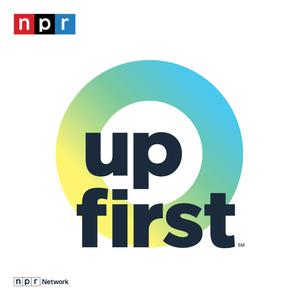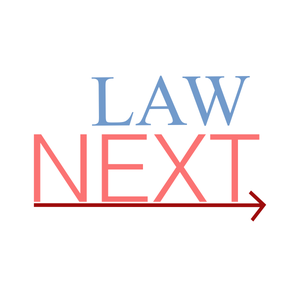
The Geek In Review
Greg Lambert & Marlene Gebauer
Welcome to The Geek in Review, where podcast hosts, Marlene Gebauer and Greg Lambert discuss innovation and creativity in legal profession.
- 43 minutes 18 seconds50 Episodes of Legal Innovation and a Chat with Google NotebookLM
In this special year-end episode of The Geek in Review, Greg Lambert takes listeners on a unique journey through the past year’s 50 episodes, all with the help of Google’s NotebookLM audio overview tool. Inspired by Josh Kubicki of the Brainyiacs Newsletter, Greg experiments with this cutting-edge AI tool to synthesize and discuss the key themes, guests, and topics covered throughout 2024. The result is an innovative meta-conversation between Greg and AI-generated co-hosts, offering insights into the future of law and legal technology.
Key Themes from 2024:
The episodes this year highlighted critical shifts in the legal landscape, from the integration of generative AI to the rise of client-centric practices. Technology’s impact on efficiency, mental health, and the evolving role of lawyers emerged as recurrent topics. Discussions also included the push for ethical AI adoption, flat-fee models, and the importance of balancing professional and personal lives, particularly in the “Love and Legal Tech” series. NotebookLM reflected on these trends, offering a synthesized perspective on how the legal industry is adapting to innovation.Generative AI and Legal Tech:
Generative AI dominated discussions, with guests exploring its transformative potential and the skills needed to leverage it effectively. While some feared job displacement, most viewed AI as an augmentation tool, enabling lawyers to focus on higher-value tasks. Leaders like Dr. Megan Ma and Conrad Everhard shared groundbreaking projects, such as an M&A negotiation simulator, exemplifying AI’s capabilities. The conversation underscored the necessity for prompt engineering skills and ethical considerations in AI deployment.Data Management, Security, and Transparency:
The importance of robust data management and security was a consistent theme, with experts like Kelly Griswold emphasizing it as a foundational business function. Conversations also explored “garbage in, garbage out” scenarios, the need for explainable AI, and maintaining client trust through transparency. These discussions highlighted how firms must prioritize governance to ensure responsible and effective AI use.Collaboration, Social Impact, and Access to Justice:
The legal tech community’s collaborative spirit shone through in initiatives like Baker Donelson’s Legal Design Lab and Tom Martin’s LawDroid, which aim to make legal services more accessible. Guests celebrated the social impact of innovative tools designed to reduce barriers to justice and foster inclusivity. These efforts reflect a broader commitment to using technology to address systemic inequities in the legal system.Looking Ahead:
Wrapping up the year, Greg revisits the podcast’s hallmark “Crystal Ball” question, noting common predictions for the next two to five years. From AI’s continued evolution to shifts in pricing models and the rise of emotional intelligence in leadership, the future of law promises to be dynamic. This episode not only recaps a transformative year but also sets the stage for the challenges and opportunities ahead.Tune in to this engaging recap as Greg Lambert merges legal innovation with AI technology to reflect on an extraordinary year for The Geek in Review. Happy Holidays and Happy New Year!
Listen on mobile platforms: Apple Podcasts | Spotify | YouTube
30 December 2024, 10:54 am - 53 minutes 21 secondsSarah Glassmeyer and Niki Black on Legal Tech in 2024 – Highlights, Hiccups, and Hopes for 2025
In this year-end episode of The Geek in Review, hosts Marlene Gebauer and Greg Lambert are joined by legal tech experts Niki Black, Principal Legal Insight Strategist at AffiniPay, and Sarah Glassmeyer, Director of Data Curation at Legal Technology Hub, to recap the top stories of 2024. From the evolution of generative AI in legal tech to groundbreaking acquisitions, the conversation delves into the successes and challenges that shaped the year in the legal industry.
The discussion kicks off with a look at AI's growing role in legal research and practice management. Greg recalls the controversial Stanford report that questioned the reliability of AI tools marketed as hallucination-free. The guests explore the importance of unbiased evaluations, the complexity of defining legal research, and the rapid pace of AI development that often outpaces regulatory and academic studies. Sarah highlights the need for peer-reviewed analysis to guide the effective use of these tools, while Niki emphasizes the user-friendly interfaces that generative AI brings to legal software.
Marlene shifts the conversation toward the challenges of integrating AI into law firms’ existing frameworks. The hosts and guests discuss the hesitancy of document management systems to adopt generative AI due to trust and security concerns. Niki and Sarah examine how firms are adapting to AI by organizing data more effectively and addressing client expectations. They also reflect on the potential of AI to bridge access-to-justice gaps, with tools that empower self-represented litigants and underserved communities.
The episode takes a closer look at notable mergers and acquisitions in 2024, such as Bloomberg’s acquisition of Dashboard Legal and Thomson Reuters’ purchase of SafeSign Technologies. Sarah raises concerns about the consolidation of the legal tech market, warning of diminished innovation and competition. Niki observes how cloud-based technologies have facilitated these integrations, making it easier for companies to offer comprehensive solutions that touch multiple aspects of legal practice.
Wrapping up, the group forecasts trends for 2025, including regulatory developments around AI and shifting priorities within law firms regarding tech adoption. While some predictions are cautious, like Sarah’s concern over the impact of external political factors on the tech workforce, others remain optimistic about the growing sophistication of legal tech. The episode concludes with reflections on how the industry can better prepare junior lawyers and law students to navigate an increasingly AI-driven landscape.
Join Marlene, Greg, Niki, and Sarah for this insightful look back at 2024 and an exciting glimpse into the year ahead. As always, we thank our listeners for tuning in, and we encourage you to share this episode with colleagues and connect with us on LinkedIn or Blue Sky!
Listen on mobile platforms: Apple Podcasts | Spotify | YouTube
Twitter: @gebauerm, or @glambert
Email: [email protected]
Music: Jerry David DeCicca23 December 2024, 11:27 am - 40 minutes 55 secondsHarnessing AI for Litigation: Mark Doble on Alexi’s Next Evolution
This week on The Geek in Review, we sit down with Mark Doble, Co-Founder and CEO of Alexi, to discuss the state of AI-driven tools in the legal industry and how they are evolving to meet the needs of modern litigation practices. The conversation begins with a timely debate on measuring productivity in remote work settings. Doble, coming from a background in both law and software engineering, draws intriguing parallels between how legal services and software development measure output and efficiency.
Moving on to Alexi’s core offering, Doble delves into how the platform is currently being used by litigators. He explains that Alexi’s AI technology not only handles the tedious work of research and memo drafting but also provides opportunities for lawyers to explore creative, strategic approaches to cases. By automating routine tasks, Alexi empowers attorneys to focus on high-level legal reasoning and client goals, rather than sifting through mountains of documents.
A key aspect of the discussion centers on the ways in which AI tools, like Alexi, can transform junior associate work. Instead of solely performing rote research or document review, younger lawyers can now leverage these tools as teaching aids, accelerating their path to deeper legal understanding. Doble emphasizes that as automation becomes more sophisticated, the human lawyer’s role in guiding strategy and exercising judgment grows ever more critical.
Doble then addresses concerns around data security and confidentiality. He reiterates that while the underlying technology is evolving, core principles of security remain the same—encrypting data, controlling access, and ensuring that information is never inadvertently trained into the model’s outputs. He acknowledges emerging questions around work product and privilege but sees them as part of the natural adaptation cycle in adopting new technology.
Finally, looking ahead, Doble hints at a significant upcoming announcement from Alexi early next year. He suggests that this new release will push beyond current capabilities, bridging the gap between mere information retrieval and genuine “legal reasoning” support. While keeping details under wraps, Doble leaves listeners with a vision of AI as a true partner in litigation, promising exponential improvements that will redefine how attorneys practice law.
Links:
Listen on mobile platforms:
Apple Podcasts | Spotify | YouTube
Twitter: @gebauerm, or @glambert
Email: [email protected]
Music: Jerry David DeCiccaTRANSCRIPT
16 December 2024, 11:00 am - 41 minutes 16 secondsCommunication, AI, and the Human Side of Law: Insights from Smokeball’s Jane Oxley
This week we welcome Jane Oxley, Chief Revenue Officer at Smokeball, to discuss the pivotal role of communication in legal organizations and how AI is transforming legal practice management. While normally in Australia, we were lucky enough to find Jane while she was working in Chicago, Jane shares her global perspective on communication challenges, bridging time zones, and the creative ways Smokeball leverages technology to streamline law firm operations. Co-host, Greg Lambert kicked off the show by introducing the concept of “Lambert’s Law,” highlighting that “all problems are communication problems,” setting the tone for an insightful discussion on organizational efficiency.
Jane explains how effective communication structures can reveal the health of an organization, whether through Slack’s rapid exchanges or more traditional law firm channels like email and face-to-face meetings. She notes the unique challenges faced by smaller firms, particularly their focus on casework over internal collaboration. Smokeball addresses these needs by integrating AI tools that help firms manage cases, streamline communication, and reduce administrative burdens, allowing lawyers to feel more in control of their workflows.
Jane Oxley and Marlene Gebauer also discuss the role of AI in enhancing productivity and profitability. Jane describes Smokeball's AI tool, Archie, which helps automate document creation, email drafting, and summarization tasks. With AI handling routine work, lawyers can dedicate more time to client interaction and higher-value tasks. This shift not only increases efficiency but also helps smaller firms bill more accurately for their time—a long-standing challenge in the legal industry.
Addressing the potential impact of AI on the billable hour, Jane shares her perspective on the slow but inevitable shift toward value-based billing. She emphasizes that while AI enhances efficiency, widespread change in billing models requires education and a mindset shift. Some firms have begun experimenting with alternative billing structures, but the transition is gradual and nuanced, varying by practice area. Ultimately, AI tools empower firms to deliver better client service and justify their fees confidently.
Finally, the discussion highlights ethical considerations in adopting AI, particularly regarding client data privacy and regulatory compliance. Jane advises firms to be vigilant in choosing trusted AI providers and implementing safeguards. She predicts that AI will amplify client expectations for efficiency and responsiveness, but the human side of law—empathy, communication, and trust—will remain irreplaceable. By embracing AI to manage routine tasks, firms can focus on delivering exceptional client experiences, making the human element the true winner in this evolving landscape.
Listen on mobile platforms: Apple Podcasts | Spotify | YouTube
Twitter: @gebauerm, or @glambert
Email: [email protected]
Music: Jerry David DeCicca9 December 2024, 11:00 am - 40 minutes 13 secondsRevolutionizing Due Diligence: Elena Tsalanidis and Justin Hansky From Deeligence
This week, we talk with Elena Tsalanidis and Justin Hansky, co-founders of Deeligence, a revolutionary due diligence workflow tool. Hailing from Australia, this dynamic duo delves into the challenges of traditional due diligence processes and how their AI-powered platform aims to streamline and optimize legal workflows for greater efficiency and accuracy.
Elena Tsalanidis and Justin Hansky share their personal journeys that led to the creation of Deeligence. From Elena’s background in human rights litigation and her experience working at Buckingham Palace, to Justin’s tenure as an M&A lawyer, their combined expertise and insights have laid the foundation for an innovative solution in legal tech. Their unique approach to addressing inefficiencies in due diligence is rooted in their deep understanding of both the practice and business of law.
The hosts and guests explore the skepticism surrounding generative AI in the legal field, including transparency and the accuracy of outputs. Elena and Justin emphasize that Deeligence prioritizes clarity and user trust by integrating human oversight into the process. They outline how their platform simplifies document review, reduces the need for exhaustive scoping, and enables legal professionals to identify key contract provisions quickly and confidently.
Implementing new technologies in law firms often encounters resistance due to entrenched practices and security concerns. The Deeligence team discusses their strategies for encouraging adoption, from ensuring ease of use to providing verifiable results. They also highlight the importance of fostering internal champions who recognize the value of modern tools in enhancing legal service delivery and client satisfaction.
Deeligence challenges the traditional billable hour model by enhancing the efficiency of tasks like due diligence. The platform allows firms to offer fixed-fee models without compromising the quality of their work, enabling them to surface critical issues across all documents instead of relying on selective reviews. This shift promotes more comprehensive client outcomes and cost predictability, marking a significant transformation in how legal services are delivered.
Looking ahead, Elena and Justin discuss their aspirations for Deeligence, including expanding into international markets like the US and UK. They express their commitment to staying at the forefront of legal tech innovation, continually improving their platform to meet evolving industry needs. Their insights underscore a broader trend of specialized, user-focused AI solutions redefining the legal landscape.
Listeners are invited to connect with Elena and Justin to learn more about Deeligenceand its impact on legal workflows. This episode provides a compelling look into how technology and a fresh perspective can address long-standing challenges in the legal profession.
Listen on mobile platforms: Apple Podcasts | Spotify | YouTube
Twitter: @gebauerm, or @glambert
Email: [email protected]
Music: Jerry David DeCiccaTRANSCRIPT
2 December 2024, 11:00 am - 48 minutes 57 secondsDemocratizing Law with Descrybe.ai's Kara Peterson and Rich DiBona
[Ed Note: We were holding off on publishing this episode because we were waiting on the official announcement that Kara Peterson and Rich DiBona of Descrybe.ai were the Silver Anthem Award winners in Best Use of AI from the International Academy of Digital Arts & Sciences! Congratulations to Kara and Rich for the prestigious award! - GL]
In this episode of "The Geek in Review," we welcome Kara Peterson and Richard DiBona, the dynamic married duo behind Descrybe.ai. Descrybe is an AI-powered legal tool aimed at democratizing access to legal information, particularly by providing summarized legal decisions that make case law more accessible to everyone. The conversation centers around how Descrybe was created, its mission, and the challenges and opportunities involved in developing a legal tech tool that truly serves its users.
Kara and Rich share the story of how Descrybe began as a personal project sparked by a challenging legal issue they faced themselves. Rich, a software engineer, started experimenting with AI summarization of judicial opinions and was struck by how well it worked. Over time, this experiment evolved into Descrybe—a platform that not only delivers quick case law summaries but also enhances accessibility through simplified language and multilingual support. They delve into the technical challenges of managing massive datasets of judicial opinions and ensuring that their platform remains accurate and reliable.
The development of Descrybe has been heavily influenced by user feedback, which Kara and Rich emphasize throughout the episode. They explain how advisory feedback has been instrumental in shaping key features, such as Spanish translations and simplified summaries, which make the platform more accessible to non-native English speakers and those with varying levels of reading proficiency. Their genuine commitment to evolving the product based on user needs is a core aspect of Descrybe's mission to democratize legal information.
A particularly intriguing segment of the episode focuses on Rich's perspective on the legal tech market and his skepticism regarding companies that label their offerings as "LLMs" (large language models) without meeting the threshold of a true LLM. Kara adds her insights on the broader mission of Descrybe: not only to innovate within legal tech but also to address access to justice as a public health issue. They both underscore the importance of responsible AI development, ensuring that new technology genuinely benefits society rather than exacerbating existing inequalities.
Towards the end of the episode, Kara and Rich discuss the future of AI in the legal industry and the role Descrybe aims to play. They express optimism that AI can be a powerful force for improving the legal system, especially if it is used to automate lower-level tasks and free up lawyers to focus on more impactful work. They also highlight the potential for AI to facilitate alternative dispute resolutions, diverting some cases from the courts altogether. Kara concludes on a hopeful note, emphasizing that if the right choices are made now, AI could be a driving force for positive systemic change within the legal field.
This conversation with Kara Peterson and Richard DiBona offers a candid, behind-the-scenes look at building Descrybe—a legal tech solution driven by a mission to improve access to justice. Their commitment to making complex legal information understandable for everyone shines through, making this episode a must-listen for anyone interested in the intersection of technology, law, and social good.
Listen on mobile platforms: Apple Podcasts | Spotify | YouTube
Twitter: @gebauerm, or @glambert
Email: [email protected]
Music: Jerry David DeCicca19 November 2024, 5:03 pm - 32 minutes 47 secondsTom Martin on LawDroid's Impact in Legal Tech
This week we welcome Tom Martin, founder of LawDroid, a pioneering AI platform aimed at transforming legal workflows through automation and no-code solutions. Tom shares his journey from practicing law to creating LawDroid, which supports legal professionals with tools designed to streamline tasks, enhance client communication, and automate document preparation. Throughout the conversation, Tom emphasizes how LawDroid is reshaping legal tech and access to justice, especially for underserved communities, by integrating generative AI and language processing into accessible, customizable applications.
Tom dives into the advantages of generative AI in legal practice, noting how tools like LawDroid take the heavy lifting out of document summarization, drafting, and other language-intensive tasks. He describes how AI-driven “agents” provide round-the-clock assistance to clients, effectively extending support beyond traditional working hours. The discussion also covers Tom’s views on AI’s potential to increase accessibility in the legal field, particularly through collaborations with legal aid organizations, allowing individuals to quickly find information and resources following natural disasters or legal challenges.
Beyond practical tools, Tom discusses how LawDroid leverages no-code options, enabling law firms of all sizes to customize solutions without heavy technical knowledge. He highlights LawDroid's AI receptionist, lead capture bots, and document automation features, which empower legal professionals to serve clients more efficiently and affordably. Tom also shares insights into how LawDroid’s adaptability allows it to serve various legal practices, from estate planning to client intake processes, with options for those looking for hands-on or fully supported implementations.
The conversation further explores the implications of AI on the legal profession’s future, including both the potential for job transformation and the significant efficiency gains that AI brings. Tom reassures listeners that while AI may shift certain roles, it ultimately enhances lawyers' ability to focus on complex and meaningful work, opening doors for expanded client bases and reduced costs for legal representation. He also speaks to data security, underscoring LawDroid’s commitment to protecting client data and privacy in compliance with ethical standards.
To conclude, Tom shares his thoughts on the importance of fostering a collaborative legal tech community, reflected in his co-founding of the Legal Technology Awards. He underscores the need to continually recognize leaders in the industry who are committed to social impact, innovation, and improving access to justice. As the interview wraps up, Tom looks forward to future developments in AI, advocating for an inclusive legal system that leverages technology to guarantee access to justice for all.
For more insights from Tom Martin and to learn about LawDroid, check out the links below.
Links & Resources
- LawDroid website
- LawDroid Manifesto on Substack
- Follow LawDroid on social media: @LawDroid
Listen on mobile platforms: Apple Podcasts | Spotify | YouTube
Twitter: @gebauerm, or @glambert
Email: [email protected]
Music: Jerry David DeCicca11 November 2024, 11:00 am - 31 minutes 14 secondsRevolutionizing Legal Talent Management: Laura Leopard and Phil Flora on PROWESS from Leopard Solutions
This week we welcome back Laura Leopard and Phil Flora from Leopard Solutions to discuss their latest innovation, the PROWESS platform. This newly launched tool aims to transform the way corporate legal departments manage and evaluate their relationships with outside counsel. As Leopard Solutions embarks on this new phase after its acquisition by SurePoint, Laura and Phil delve into how PROWESS brings unprecedented capabilities to legal teams by centralizing data, enhancing decision-making, and simplifying the selection process of legal talent.
Laura explains that the PROWESS platform was born out of the need to streamline the outdated methods many in-house legal teams use to locate outside counsel. Rather than relying on personal contacts or spreadsheets, PROWESS leverages Leopard Solutions' extensive database of over 6,000 law firms to offer data-driven insights. The platform allows legal departments to search for attorneys and law firms by specialization, diversity metrics, and even billing structures, providing a comprehensive overview that helps corporate counsel make informed, strategic choices for their legal needs.
One of the key features of PROWESS is its 360-degree firm report and ranking system, powered by Leopard Solutions' unique data-driven methodology. Phil explains how the platform’s rankings go beyond traditional metrics, focusing on firm growth, retention, and diversity within the attorney ranks. By incorporating continuous updates and client feedback, the ranking system serves as a real-time indicator of a firm’s standing in the market. Over time, the platform will enable in-house teams to provide feedback on engagements, further refining the rankings and enabling firms to showcase the quality of their work.
The PROWESS platform also offers law firms an opportunity to proactively market their strengths. Law firms can contribute their own data to the platform, such as alternative fee arrangements and attorney billing rates, which helps them stand out in searches. Laura and Phil highlight how this “passive marketing” tool allows firms to differentiate themselves in a competitive market, as corporate clients can explore and assess options they may not have previously considered. Phil emphasizes that this feature is particularly valuable for smaller and mid-sized firms, allowing them to compete alongside larger firms by showcasing their specific expertise.
In closing, Laura and Phil share their vision for the future of PROWESS. They envision it evolving into a more comprehensive marketplace, potentially allowing firms to bid on posted matters. Both are excited about the potential for increased transparency and efficiency in the legal industry as PROWESS matures, facilitating stronger relationships between law firms and in-house legal teams. With plans to integrate AI-driven features and client feedback mechanisms, Leopard Solutions is poised to shape the future of legal talent management and engagement.
Listen on mobile platforms: Apple Podcasts | Spotify | YouTube
Twitter: @gebauerm, or @glambert
Email: [email protected]
Music: Jerry David DeCicca4 November 2024, 12:36 pm - 39 minutes 27 secondsTim Follett on Legal Data Visualization and Structure Flow
This week we welcome Tim Follett, the founder and CEO of Structure Flow, a visual structuring tool designed specifically for lawyers. The conversation begins with a light-hearted discussion about recent events each attended. Greg shares his experience at the KM&I conference in New York, while Tim recounts his time at the Legal Geek conference in London. Marlene, not to be left out, talks about participating in Houston's Biketoberfest at the ION innovation hub and her insightful presentation with Ian Wilson from Servient on eDiscovery workflow.
Tim delves into his experience at Legal Geek, highlighting the festival-like atmosphere and the palpable momentum within the legal tech ecosystem. He notes a significant increase in focus on AI and legal technology, emphasizing how these tools are becoming integral in the industry. The diversity and growth of the event reflect the expanding interest and investment in legal tech solutions worldwide.
The discussion transitions to the critical role of data visualization in the legal sector. Tim explains how his frustrations as a corporate attorney—particularly the tedious process of creating structure charts in PowerPoint—led him to develop Structure Flow. He underscores the importance of visual tools in capturing and communicating complex information, making it more accessible and understandable. Visualizing relationships and connections help lawyers cut through complexity, a necessity in today's intricate legal landscape.
Exploring the integration of AI, Tim describes how Structure Flow leverages artificial intelligence to enhance data visualization. By using large language models, the platform can automate the translation of written language into visual diagrams, effectively reducing manual workload and increasing efficiency. This capability is particularly useful in tasks like legal entity rationalization, where visualizing extensive data sets can be daunting and time-consuming.
Looking ahead, Tim shares his vision for the future of visualization tools in the legal industry. He envisions a seamless, interconnected tech stack where lawyers can initiate new matters with AI assistance, pulling in all necessary information and working across multiple platforms through a unified interface. This integrated approach aims to reduce mental load, improve collaboration, and ultimately transform how legal professionals interact with complex data. The episode concludes with Tim's enthusiasm about expanding Structure Flow's presence in the U.S. market, bolstered by recent Series A funding, and his insights into the evolving landscape of legal technology.
Listen on mobile platforms: Apple Podcasts | Spotify | YouTube
Twitter: @gebauerm, or @glambert
Email: [email protected]
Music: Jerry David DeCiccaTranscript
28 October 2024, 10:00 am - 1 hour 37 secondsDesigning the Future of Law: Inside Faegre Drinker's Legal Design Lab Relaunch
This week, we talk with a team of innovation leaders from the law firm Faegre Drinker. The guests included Shawn Swearingen, Chief Innovation Officer; David Gross, Design Lab co-founder; and Ruben Gonzalez, Design Lab Director. The discussion centered around the relaunch of Faegre Drinker's Legal Design Lab in Scottsdale, Arizona, exploring its origins, evolution, and impact on legal problem-solving.
The Legal Design Lab's inception traces back eight or nine years when an associate at the firm, Helen Chacon, reconnected with her Stanford Law School friend Margaret Hagan, who was pioneering the concept of legal design. Intrigued by the idea of applying design thinking—a user-focused, empathetic approach to problem-solving long used in other industries—to the legal field, the firm embarked on a deep dive into the methodology. This included David (DJ) Gross auditing courses at Stanford's D-School and team members like Kate Rozavi designing courses on visual advocacy at the University of Minnesota Law School.
The relaunch and relocation of the Design Lab to Scottsdale were influenced by several factors, notably the firm's merger that expanded its geographic footprint and the practical considerations brought about by the COVID-19 pandemic. The move allowed the firm to acquire a significantly larger and more cost-effective space. With input from architects, designers, and Margaret Hagan herself, the new lab was designed to be a flexible, creative environment featuring movable furniture and an industrial aesthetic, fostering collaboration and innovation.
Throughout the podcast, the team shared concrete examples of how design thinking has been instrumental in solving complex legal challenges. One such example involved simplifying a profitability tool for lawyers by using a color-coded system akin to credit score reports, making it more accessible and actionable. Another highlighted the use of tennis balls to demystify crystallography during a jury trial, showcasing how visual aids and empathetic explanations can lead to successful outcomes. These instances underscore the lab's focus on user-centric solutions and visual advocacy to enhance understanding and efficiency in legal processes.
The guests also discussed the challenges of integrating design thinking within the traditional legal framework, particularly in encouraging open-mindedness and collaborative participation among lawyers and clients. They emphasized the importance of a learning mindset, active listening, and the willingness to embrace creativity and risk-taking. To further disseminate these ideas, the team mentioned an eBook available on their website, aimed at introducing legal professionals to design thinking and visual advocacy concepts.
Links:
- Faegre Drinker Design Lab video
- Faegre Drinker Picks Arizona for the Next-Gen Design Lab, American Lawyer
- E-book – Design Thinking and Visual Advocacy for Lawyers Two Point Oh! (FREE)
- Innovations in Visual Advocacy – Leading the way for design thinking in law, Harvard Law School Center on the Legal Profession.
- Advancing Company Goals – Design sprints that unlock Innovation, Corporate Counsel.
Listen on mobile platforms: Apple Podcasts | Spotify | YouTube
Twitter: @gebauerm, or @glambert
Email: [email protected]
Music: Jerry David DeCicca
Transcript
21 October 2024, 10:00 am - 58 minutes 44 secondsBridging Legal Practice and AI: K&L Gates and AltaClaro Innovate Legal Training
In this episode of The Geek in Review, hosts Marlene Gebauer and Greg Lambert are joined by Carolyn Austin, Director of Practice Innovation at K&L Gates; Brendan McDonnell, Partner at K&L Gates; and Abdi Shayesteh, CEO of AltaClaro. The conversation delves into innovative legal education strategies and the integration of generative AI in legal practice, highlighting how experiential learning platforms are shaping the future of legal training.
Abdi introduces AltaClaro's experiential learning platform, designed to make lawyers practice-ready through simulation-based training. Utilizing a "Learn, Do, Review" methodology, the platform presents associates with real-world assignments, provides feedback from seasoned practitioners, and facilitates live review sessions. This approach aims to build confidence, enhance critical thinking skills, and improve efficiency among legal professionals by immersing them in practical scenarios that mirror actual legal work.
Brendan discusses K&L Gates' longstanding commitment to innovation and education within the legal industry. He reflects on the firm's history of embracing technology—such as developing one of the first e-discovery platforms—and its proactive stance on integrating generative AI into legal workflows. Recognizing the transformative potential of AI, K&L Gates formed an AI Solutions Group to prepare attorneys and allied professionals for the technological advancements reshaping legal practice.
Carolyn explains how K&L Gates collaborated with AltaClaro to develop specialized training programs focused on generative AI, including prompt engineering and supervisory courses. These programs address the challenges partners and managers face when integrating AI tools into their workflows, emphasizing ethical considerations, risk assessment, and effective supervision. The partnership ensures that all firm members, from associates to senior partners, are equipped with the necessary skills to use AI responsibly and effectively.
The guests explore the broader implications of AI adoption in the legal field, discussing challenges such as change management, ethical obligations, and the need for data-driven practices. They highlight the importance of fostering a culture of continuous learning and collaboration to stay ahead in a rapidly evolving industry. Looking toward the future, they express optimism about AI's potential to enhance legal services, improve access to justice, and drive innovation, emphasizing the critical role of education and adaptability in this transformation.
Listen on mobile platforms: Apple Podcasts | Spotify | YouTube
Twitter: @gebauerm, or @glambert
Email: [email protected]
Music: Jerry David DeCicca
Transcript
14 October 2024, 10:00 am - More Episodes? Get the App
Your feedback is valuable to us. Should you encounter any bugs, glitches, lack of functionality or other problems, please email us on [email protected] or join Moon.FM Telegram Group where you can talk directly to the dev team who are happy to answer any queries.
 How I Built This with Guy Raz
How I Built This with Guy Raz
 The Daily
The Daily
 Up First from NPR
Up First from NPR
 LawNext
LawNext
 Planet Money
Planet Money